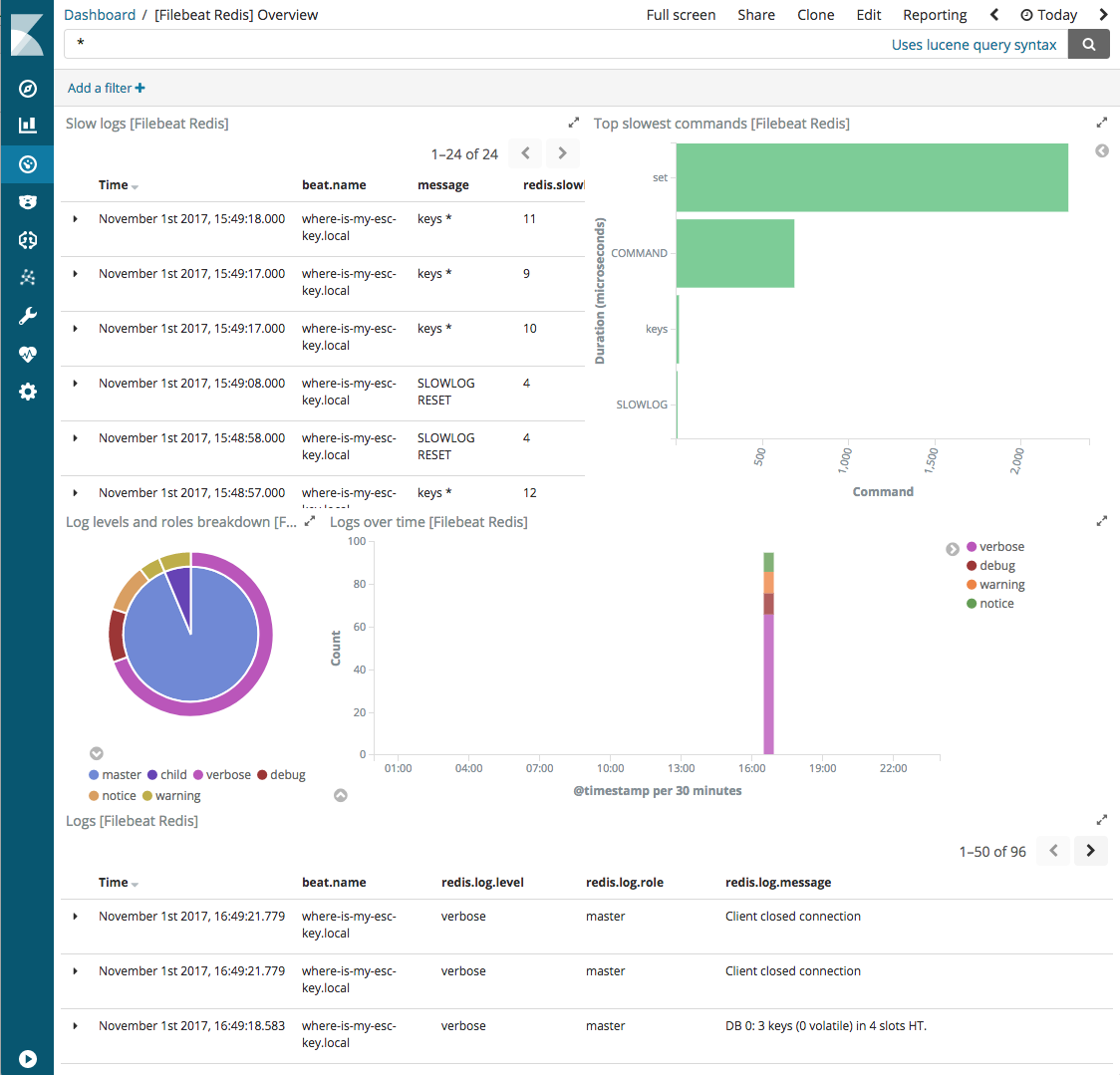Redis module
editRedis module
editThe redis module parses logs and slowlogs created by
Redis.
When you run the module, it performs a few tasks under the hood:
- Sets the default paths to the log files (but don’t worry, you can override the defaults)
- Makes sure each multiline log event gets sent as a single event
- Uses ingest node to parse and process the log lines, shaping the data into a structure suitable for visualizing in Kibana
- Deploys dashboards for visualizing the log data
Read the quick start to learn how to configure and run modules.
The redis module has two filesets:
-
The
logfileset collects and parses the logs that Redis writes to disk. -
The
slowlogfileset connects to Redis via the network and retrieves the slow logs by using theSLOWLOGcommand.
For the log fileset, make sure the logfile option, from the Redis
configuration file, is set to redis-server.log.
For the slowlog fileset, make sure the slowlog-log-slower-than option, from
the Redis configuration file, is set to a lower value than the default one.
Compatibility
editThe Redis log fileset was tested with logs from Redis versions 1.2.6, 2.4.6, and 3.0.2, so we
expect compatibility with any version 1.x, 2.x, or 3.x.
On Windows, the default paths assume that Redis was installed from the Chocolatey repository.
The Redis slowlog fileset was tested with Redis 3.0.2 and 2.4.6. We expect compatibility with any
Redis version newer than 2.2.12, when the SLOWLOG command was added.
Configure the module
editYou can further refine the behavior of the redis module by specifying
variable settings in the
modules.d/redis.yml file, or overriding settings at the command line.
The following example shows how to set paths in the modules.d/redis.yml
file to override the default paths for Redis logs. It also shows how to set the
host and password to retrieve slow logs:
- module: redis
log:
enabled: true
var.paths: ["/path/to/log/redis/redis-server.log*"]
slowlog:
enabled: true
var.hosts: ["localhost:6378"]
var.password: "YOUR_PASSWORD"
To specify the same settings at the command line, you use:
-M "redis.log.var.paths=[/path/to/log/redis/redis-server.log*]" -M "redis.slowlog.var.hosts=[localhost:6378]" -M "redis.slowlog.var.password=[YOUR_PASSWORD]"
Variable settings
editEach fileset has separate variable settings for configuring the behavior of the
module. If you don’t specify variable settings, the redis module uses
the defaults.
For advanced use cases, you can also override input settings. See Override input settings.
When you specify a setting at the command line, remember to prefix the
setting with the module name, for example, redis.log.var.paths
instead of log.var.paths.
log fileset settings
edit-
var.paths -
An array of glob-based paths that specify where to look for the log files. All
patterns supported by Go Glob
are also supported here. For example, you can use wildcards to fetch all files
from a predefined level of subdirectories:
/path/to/log/*/*.log. This fetches all.logfiles from the subfolders of/path/to/log. It does not fetch log files from the/path/to/logfolder itself. If this setting is left empty, Filebeat will choose log paths based on your operating system.
slowlog fileset settings
edit-
var.hosts -
An array of hosts to which Filebeat should connect to retrieve the slow logs. If
left empty,
localhost:6379is assumed. -
var.password -
The password to use to connect to Redis, in case Redis authentication is enabled
(the
requirepassoption in the Redis configuration).
Example dashboard
editThis module comes with a sample dashboard. For example:

Fields
editFor a description of each field in the module, see the exported fields section.